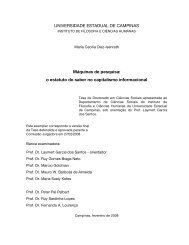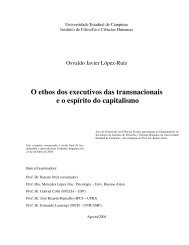- Page 1 and 2:
Universidade Estadual de Campinas J
- Page 3:
FICHA CATALOGRÁFICA ELABORADA PELA
- Page 6 and 7:
Agradecimentos Agradeço a Laymert
- Page 8 and 9:
ABSTRACT In this work practices and
- Page 10 and 11:
Sumário [PRÓLOGO] ...............
- Page 12 and 13:
3.8 PÉROLAS AOS PORCOS: A COMUNICA
- Page 14 and 15:
1 [Prólogo]
- Page 16 and 17:
“Recombinant” 3 [Apresentação
- Page 18 and 19:
Mullooly, confiante toupeira, fez o
- Page 20 and 21:
einventado. E quase tudo volta a vi
- Page 22 and 23:
os outros mas, em certo sentido, a
- Page 24 and 25:
espécie de parafuso que avança po
- Page 26 and 27:
social da ciência é construída m
- Page 28 and 29:
Ômega” de perfeição 18 , adapt
- Page 30 and 31:
não conseguimos pegar a não ser c
- Page 32 and 33:
sistemas de retroalimentação capi
- Page 34 and 35:
Recentemente, se pode observar uma
- Page 36 and 37:
1.1. Bad boys da ciência Em dezemb
- Page 38 and 39:
Venter reúne características que,
- Page 40 and 41:
ideal de ciência e de cientista de
- Page 42 and 43:
química e elétrica. Ela havia se
- Page 44 and 45:
C&T. Bush, embora fosse, como é ho
- Page 46 and 47:
como imune, externa aos valores pol
- Page 48 and 49:
(Lazzarato e Negri, 2001), com o tr
- Page 50 and 51:
Ruy Sardinha Lopes também consider
- Page 52 and 53:
Neste sentido, seja velha ou nova a
- Page 54 and 55:
tanto nas empresas quanto nas insti
- Page 56 and 57:
Conseqüentemente, dizem os enuncia
- Page 58 and 59:
como o capital consegue direcionar
- Page 60 and 61:
1.4. A aceleração acelerada da pr
- Page 62 and 63:
produção, na publicação e nos r
- Page 64 and 65:
1.4.2 Sobre os ombros de gigantes v
- Page 66 and 67:
século XVII até hoje, a ciência,
- Page 68 and 69:
1930, a de não escrever 66 . Publi
- Page 70 and 71:
esgotamento na década de 80 e que
- Page 72 and 73:
e nos interesses do capitalismo co-
- Page 74 and 75:
Há, obviamente, exceções importa
- Page 76 and 77:
criado tais objetos, é só por mei
- Page 78 and 79:
Hoje, especialmente no mundo anglo-
- Page 80 and 81:
Sinergias, eficiência, spin-off 77
- Page 82 and 83:
Figura 14. Edital do “Desafio da
- Page 84 and 85:
como “agente de mudança” e des
- Page 86 and 87:
colégio 84 dos apaixonados pela sc
- Page 88 and 89:
a primeira se produz na época da S
- Page 90 and 91:
conhecimento. O “Modo 2”, fruto
- Page 92 and 93:
esponde para a ciência” (Nowotny
- Page 94 and 95:
mesmo tempo”, “produzir pesquis
- Page 96 and 97:
natureza]. Os pesquisadores industr
- Page 98 and 99:
Embora o fenômeno não seja certam
- Page 100 and 101:
tecnológico”, deve mudar, e aban
- Page 102 and 103:
(1994) atribuem a este “novo cont
- Page 104 and 105:
podem ser utilizados para identific
- Page 106 and 107:
- Spin-off 93 , incubadoras 94 , po
- Page 108 and 109:
CAPÍTULO 2 Modular a imanência Go
- Page 110 and 111:
Quem decide o trajeto das estrelas?
- Page 112 and 113:
Em suma, não querendo cair no simp
- Page 114 and 115:
Forças econômicas e processos soc
- Page 116 and 117:
técnicas, permite entender como fu
- Page 118 and 119:
uma teoria “de campo” 108 . Enf
- Page 120 and 121:
“inscritas” sobre o corpo. 2. H
- Page 122 and 123:
questões postas pelo enfrentamento
- Page 124 and 125:
2.2 População, segurança, biopol
- Page 126 and 127:
quais os indivíduos gerem e conduz
- Page 128 and 129:
indivíduo racional para um único
- Page 130 and 131:
panóptico benthamiano 122 é “a
- Page 132 and 133:
mercado como algo constantemente su
- Page 134 and 135:
enfrentando determinadas perdas. N
- Page 136 and 137:
pode ser gerida como um capital. De
- Page 138 and 139:
único possível. Não é o único
- Page 140 and 141:
universais, a uma determinação ú
- Page 142 and 143:
definição rigorosa, já em Vigiar
- Page 144 and 145:
pode e não pode ser dito, o que é
- Page 146 and 147:
2.8 Tecnociência e governamentalid
- Page 148 and 149:
PARTE II LIQUENOLOGIA 137 [DO [DO D
- Page 150 and 151:
CAPÍTULO 3 O discurso da necessida
- Page 152 and 153:
Em 1602, em sua eufórica utopia, A
- Page 154 and 155:
funcionamento da tecnociência. Tai
- Page 156 and 157:
discurso nativo. Um pesquisador ent
- Page 158 and 159:
fundamental perseguir este elemento
- Page 160 and 161:
3.1.1 Elementos e categorias de an
- Page 162 and 163:
Quadro 3. Mapa de algumas narraçõ
- Page 164 and 165:
Campos narrativos e tipo de enuncia
- Page 166 and 167:
Depois disso, mostrarei exemplos co
- Page 168 and 169:
aproveitam a pureza e neutralidade
- Page 170 and 171:
- O senhor seqüenciou o seu genoma
- Page 172 and 173:
cognitivo ou cultural, um “gap”
- Page 174 and 175:
3.3 A narrativa do Progresso Figura
- Page 176 and 177:
A gênese, aliás, a recombinação
- Page 178 and 179:
considerada superior. Para os Renas
- Page 180 and 181:
As filosofias que apareciam no cen
- Page 182 and 183:
Hoje, a imagem de novidade funciona
- Page 184 and 185:
tecnologia (e do capital) é inexor
- Page 186 and 187:
Figura 22. Andreas Vesalius. Ilustr
- Page 188 and 189:
3.5 A vingança dos “vis mecânic
- Page 190 and 191:
interná-lo” 172 , também não e
- Page 192 and 193:
escrevia Hooke - eram inadequados p
- Page 194 and 195:
caixa preta: se afirma a idéia de
- Page 196 and 197:
véu ou um obstáculo para o sujeit
- Page 198 and 199:
Ao menos até a década de 1960, en
- Page 200 and 201:
poderiam transmutar-se em algo bast
- Page 202 and 203:
A tese de que há um saber secreto
- Page 204 and 205:
Surgidas ao redor de 1550 (a primei
- Page 206 and 207:
somente baú, fonte de monstruosida
- Page 208 and 209:
3.11 Luzes da razão. Razão das Lu
- Page 210 and 211:
com aparente deleite. Quando este e
- Page 212 and 213:
que queriam fazer da ciência sua p
- Page 214 and 215:
No outro extremo da escala social,
- Page 216 and 217:
poderia resolver todos os problemas
- Page 218 and 219:
democrático por excelência. Todos
- Page 220 and 221:
No caso de temas tecnocientíficos
- Page 222 and 223:
dos cientistas contra o governo, qu
- Page 224 and 225:
facilmente que se opor à comercial
- Page 226 and 227:
aparecem sinais alarmantes de invas
- Page 228 and 229:
218 …Unfortunately, scientists ca
- Page 230 and 231:
os cientistas se tornam autores de
- Page 232 and 233:
A tecnociência possui, de certa fo
- Page 234 and 235:
comerciantes” de que se orgulhava
- Page 236 and 237:
o apoio da maioria da população,
- Page 238 and 239:
financiadas com recursos públicos
- Page 240 and 241:
Quadro 15. 1915-2000. Nevralgias so
- Page 242 and 243:
4.2.2 Cientistas em campo Em fevere
- Page 244 and 245:
fundaram o “Comitê Pesquisa e Sa
- Page 246 and 247:
Em novembro de 1999, por exemplo, a
- Page 248 and 249:
dominam o panorama tecnocientífico
- Page 250 and 251:
No Mundo No Brasil desenvolvimento
- Page 252 and 253:
ou uma crescente sutileza e eficiê
- Page 254 and 255:
quanta atrazina 251 pode ficar na
- Page 256 and 257:
apenas para divulgar suas pesquisas
- Page 258 and 259:
midiática. Quando os cientistas fa
- Page 260 and 261:
físicos e químicos privada de fun
- Page 262 and 263:
espaço público, para aumentar exp
- Page 264 and 265:
Minutos”. Alguns cientistas, em s
- Page 266 and 267:
de empregados ou para estipular seg
- Page 268 and 269:
Citizens’ Summit Future Panel Hea
- Page 270 and 271:
cursos, e figurar profissionais lig
- Page 272 and 273:
públicos diferente da divulgação
- Page 274 and 275:
isco” e na exposição pública d
- Page 276 and 277:
importante. Na visão tecnocrática
- Page 278 and 279:
independentes” para participar do
- Page 280 and 281:
informado, mas da produção de con
- Page 282 and 283:
Quadro 20. Quando o conhecimento é
- Page 284 and 285:
circulam fragmentos discursivos, fa
- Page 286 and 287:
configuração do líquen discursiv
- Page 288 and 289:
Para Foucault, o pensamento de Marx
- Page 290 and 291:
Quadro 21. O líquen discursivo da
- Page 292 and 293:
Quadro 23. Redes, relações e info
- Page 294 and 295:
elativa à “libertação delibera
- Page 296 and 297:
divulgação ainda são os rótulos
- Page 298 and 299:
Quadro 24. Estratos e elementos dis
- Page 300 and 301:
Porque comunicar a ciência para o
- Page 302 and 303:
ênfase na participação social? S
- Page 304 and 305:
Estava estudando cosmologia quânti
- Page 306 and 307:
no nível coletivo, em fenômenos e
- Page 308 and 309:
tecnologias. Mas tampouco faz senti
- Page 310 and 311:
Uma vez que o dispositivo é consti
- Page 312 and 313:
potencialmente subversivos. Em nome
- Page 314 and 315:
Talvez, então, a tecnociência fun
- Page 316 and 317: os outros e exige uma rearticulaç
- Page 318 and 319: “Eis o princípio geral de Foucau
- Page 320 and 321: da constituição de um saber cient
- Page 322 and 323: A “tensão entre o capital e a so
- Page 324 and 325: seu motor (na verdade, como vimos,
- Page 326 and 327: natureza inserido numa economia de
- Page 328 and 329: pelos usuais processos democrático
- Page 330 and 331: Lista e créditos das imagens Image
- Page 332 and 333: REFERÊNCIAS ABBOTT, A. “Scientis
- Page 334 and 335: ______. Scegliere il mondo che vogl
- Page 336 and 337: COCCO, G.; PATEZ, A.; SILVA, G. (or
- Page 338 and 339: ETZKOWITZ, H; LEYDESDORFF, L. The d
- Page 340 and 341: GIDDENS, A.; BECK, U., LASH, S. Mod
- Page 342 and 343: HEIDEGGER, M. The Question Concerni
- Page 344 and 345: LAPOUGE, G. Na França, guerra entr
- Page 346 and 347: MINISTÉRIO DE CIÊNCIA E TECNOLOGI
- Page 348 and 349: ______. This Week’s Citation Clas
- Page 350 and 351: SPINK, M. J. Práticas discursivas
- Page 352 and 353: ZIMAN, J. Il lavoro dello scienziat
- Page 354 and 355: Figura 36. PIB total e porcentagem
- Page 356 and 357: Os recursos humanos em C&T (HRST) s
- Page 358 and 359: 4. Internacionalização da pesquis
- Page 360 and 361: Apêndice II I. Pontos de fluxo e e
- Page 362 and 363: “Gene Mapper. The bad boy of scie
- Page 364 and 365: III. Discursos a confronto: discipl
- Page 368 and 369: source of funding but also encourag
- Page 370 and 371: discoveries at frontiers outside th
- Page 372 and 373: quality of research in universities
- Page 374 and 375: new opportunities. The choice is cl
- Page 376 and 377: oom at 10 Downing Street, by Dr. Fr
- Page 378 and 379: interdisciplinary fields of science
- Page 380: The completion of the human genetic





